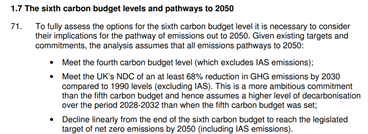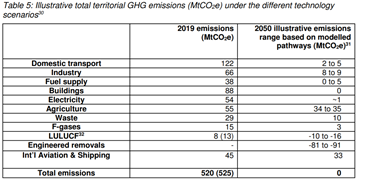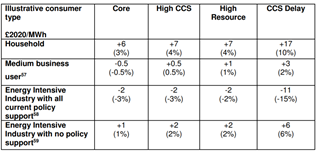Well, nothing happening on climate change today, so I thought I& #39;d have a read of a v important document - HMG& #39;s impact assessment of the 6th carbon budget decision announced this week...  https://abs.twimg.com/emoji/v2/... draggable="false" alt="🧵" title="Thread" aria-label="Emoji: Thread">(and link below for those who fancy 76 pages of hardcore analysis)
https://abs.twimg.com/emoji/v2/... draggable="false" alt="🧵" title="Thread" aria-label="Emoji: Thread">(and link below for those who fancy 76 pages of hardcore analysis)
https://www.legislation.gov.uk/ukia/2021/18/pdfs/ukia_20210018_en.pdf">https://www.legislation.gov.uk/ukia/2021...
https://www.legislation.gov.uk/ukia/2021/18/pdfs/ukia_20210018_en.pdf">https://www.legislation.gov.uk/ukia/2021...
The headline is that the new target offers a net benefit to society of £266 billion. That’s pretty big… but highly dependent on some important assumptions. So how’s it arrived at?
Costs: the estimated costs total £651 billion from 2020-2050 – average of around £20 billion / year. There’s no direct comparison with government spend (not all costs are for the taxpayer) – but to give a sense of scale, it& #39;s equivalent to about half of the annual defence budget.
Costs estimated as equivalent to 1.6% of GDP in 2035. When the Climate Change Act passed in 2008, costs of meeting 80% by 2050 were estimated at 1-2% of GDP. Core argument is that tech costs have come down so much that the same target can be met at the same cost, 15 years faster
(But important to remember that the "% of GDP" framing isn& #39;t helpful in some ways. It doesn& #39;t mean GDP will be 1.6% lower in 2035 than without action - e.g. lots of the costs could deliver other economic benefits).
On benefits: The IA says “The majority of quantified benefits are emissions savings". Translation: most quantified benefits derive from placing a value on each tonne of CO2 saved. And there are a *lot* of tonnes of CO2 saved here.
HMG has used its “high” values for carbon costs (reflecting the increased urgency of tackling climate change). Using the "central" carbon costs reduces NPV to £15bn – still positive, but much more marginal.
Pathways: The IA is the first time that HMG has given some detail on the pathway to 2050. Notable that it works on the basis that the UK will meet its 2030 NDC target. This is important and good to see as it’s higher than the target in domestic legislation.
Looking to 2050, no big surprises on the pathway – most sectors get v close to zero; still significant emissions from aviation / agriculture; heavy reliance on greenhouse gas removals (BECCS and DACCS) to offset those.
As for energy sources: in 2050, we need more than twice as much electricity as we use now; hydrogen provides as much energy as electricity usage now. Also assumes most hydrogen comes from steam methane reforming + CCS rather than electrolysis – that could well change in my view.
(An aside on hydrogen – while the IA is at pains not to specify how heat will be decarbonised, these numbers likely indicate that HMG modelling sees majority of heat decarb through heat pumps, in line with the CCC. Interesting to see whether we get more clarity on that this year)
Fossil fuel use reduces to 20% of current levels by 2050 – I assume mainly for hydrogen production. Fair to say that’s probably a good proxy for what we’ll need to do globally. If I were involved in oil and gas production, I’d be diversifying pretty quickly.
Turning to 2035 – there are some big and interesting numbers on technology deployment. Three jump out: up to 28m electric vehicles; 40% of domestic heat decarbonised, and almost all non-domestic (business/public sector) heat; and – crucially – up to 45 megatonnes of CCS.
(Oh, and electricity is up to 75% renewables, and almost entirely zero carbon. But that& #39;s the easy bit, remember).
CCUS is crucial – without it, the costs go up a *lot*, because that would require much more expensive action in other sectors. But it& #39;s risky - not deployed at scale yet in the UK. I explored this in my piece earlier this week. https://institute.global/policy/uk-climate-targets-net-zero-sum-game">https://institute.global/policy/uk...
There’s relatively little on consumer costs – presumably to be explored in more detail in the Treasury’s review of the costs of net zero. But interesting that, as in the Energy White Paper, electricity prices are due to rise only a little (but again, much more without CCS).
So to sum up: v important document; analysis is close to what @ChiefExecCCC and team produced in their advice (which is probably a good thing); and credit to the excellent team in BEIS for delivering it so quickly.
But *lots* to do on policy and detailed pathway– will be a busy few months ahead of COP26… [ends]
PS: I enjoyed the subtle nod to Margaret Thatcher – whose 1989 speech to the UN on climate change is worth a read… https://www.margaretthatcher.org/document/107817 ">https://www.margaretthatcher.org/document/...

 Read on Twitter
Read on Twitter









